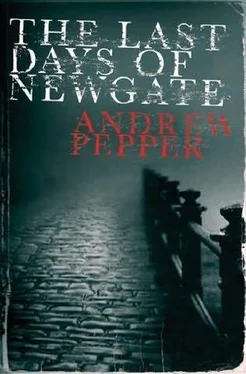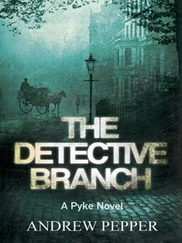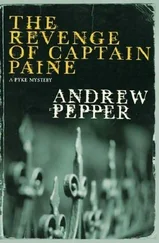Andrew Pepper - The Last Days of Newgate
Здесь есть возможность читать онлайн «Andrew Pepper - The Last Days of Newgate» весь текст электронной книги совершенно бесплатно (целиком полную версию без сокращений). В некоторых случаях можно слушать аудио, скачать через торрент в формате fb2 и присутствует краткое содержание. Жанр: Исторический детектив, на английском языке. Описание произведения, (предисловие) а так же отзывы посетителей доступны на портале библиотеки ЛибКат.
- Название:The Last Days of Newgate
- Автор:
- Жанр:
- Год:неизвестен
- ISBN:нет данных
- Рейтинг книги:4 / 5. Голосов: 1
-
Избранное:Добавить в избранное
- Отзывы:
-
Ваша оценка:
- 80
- 1
- 2
- 3
- 4
- 5
The Last Days of Newgate: краткое содержание, описание и аннотация
Предлагаем к чтению аннотацию, описание, краткое содержание или предисловие (зависит от того, что написал сам автор книги «The Last Days of Newgate»). Если вы не нашли необходимую информацию о книге — напишите в комментариях, мы постараемся отыскать её.
The Last Days of Newgate — читать онлайн бесплатно полную книгу (весь текст) целиком
Ниже представлен текст книги, разбитый по страницам. Система сохранения места последней прочитанной страницы, позволяет с удобством читать онлайн бесплатно книгу «The Last Days of Newgate», без необходимости каждый раз заново искать на чём Вы остановились. Поставьте закладку, и сможете в любой момент перейти на страницу, на которой закончили чтение.
Интервал:
Закладка:
He needed an alternative plan.
On the governor’s desk he found a letter opener in the shape of a dagger. Taking the implement in his hand, and without giving it another thought, he thrust the sharp end into Hunt’s neck and felt the metal slice through sinew and muscle. He had to step back so the blood that spilled from the wound did not cover his hands and feet.
Moments later, the turnkeys burst into the room. Before them they saw the governor’s motionless body, slumped on his desk, surrounded by a thick pool of his own blood. The man’s head, as usual, was hidden under his black hat. Behind him, the window was open. Pyke was nowhere to be seen. When one of the turnkeys raced to the window and looked down into the yard beneath him, he saw what he thought to be Pyke’s unmoving body, splattered against the hard ground.
One of the turnkeys shouted, ‘Prisoner escaped.’
The other, by the window, yelled, ‘Prisoner fallen. Get someone down there. He looks to be dead.’
Another said, ‘How in God’s name did he do it? We searched him, didn’t we?’
Still another said, ‘I take it the governor’s dead.’
‘I ain’t touching him.’
‘Fetch a doctor.’
Another voice. ‘Get the Ordinary, not a doctor. Too late for that.’
‘Come on. Let’s see whether Pyke’s dead.’
Moments later, alone in the governor’s office, Pyke removed the hat from his head and used it to wipe the governor’s blood from his face and neck. He climbed out on to the narrow window ledge. Holding on to the stone arch that framed the window, he pulled himself up on to the building’s roof and lay there for a moment, staring up into the dawn skies. In the distance, he could hear the mass of people beginning to gather outside the prison to witness a hanging that would not now take place. Then he was up on his feet and scurrying across the sloping roof. Then he lowered himself on to the wall and traversed the press yard.
Far below, he could see the outline of the governor’s body, and he moved as quickly along the wall as its narrow width would allow. At the end of the wall, he dropped down into the garden of the Royal College of Physicians, as the first of the turnkeys reached the governor’s body.
The last thing Pyke heard the man say was, ‘It’s not him. It isn’t bleedin’ him.’ Then he shouted, ‘Prisoner escaped.’
PART II
Belfast, Ireland
JULY 1829
FOURTEEN
Pyke had no idea what type of dog it was, except that it was not a pure-bred. It possessed an unkempt coat and a deformed ear, and hauled itself along on three stubby legs, the fourth being entirely lame. It was no larger than a moderate-sized ferret, and was about as lovable, but for a reason Pyke could not explain the animal had developed a fierce loyalty to him in the short time since he had disembarked from the steamship. So much so that even when he retired to his room for the night, the dog would still be waiting for him the following morning. Finding this attachment irritating rather than endearing, Pyke had tried to shoo the dog away, to no avail. It did not seem to want his affection in any explicit manner, and Pyke was far too sensible to try to pet it. Rather, it simply followed him wherever he went in the town, happily trotting behind him on its three good legs. After a day or so of this, and when a firm kick to the dog’s groin had not managed to drive it away, Pyke had relented a little and deigned to address the animal merely as ‘dog’. It seemed content with the name.
The inn, if it could be called that, jostled for attention alongside the taverns, music halls and spirit shops of North Queen Street. The area also housed the town’s main infantry barracks, which perhaps explained the large number of brothels located in the immediate vicinity. In fact, it had taken Pyke a few hours to work out that his own place of residence offered more than simply room and board. It was the kind of place in which you could die and not be discovered for days. For one thing, there was the odour: the corridors were not just damp and musty but smelt of something riper and more obscene, as though human flesh in an adjacent room had turned gangrenous. For another thing, he never actually saw any guests. He heard them, though; heard them beg for sexual relief through the paper-thin walls of his room, which was no bigger than a coffin and much less hospitable. If he’d had the money, he would have stayed in one of the hotels overlooking the Linen Hall, but his funds — effectively what he had retrieved from Godfrey’s apartment in London — were running perilously low. Such a dilemma, unfortunately, necessitated prudence.
Pyke’s search for Davy Magennis had led him to Ireland — he had been reliably informed that Magennis had long since fled London — but in Belfast he felt both anonymous and hopelessly visible. He sensed acutely the fact of being a stranger in a town where people seemed to be warily accustomed to each others’ faces. The previous day, Pyke had gone out with the intention of asking for Davy Magennis in the public houses and terraces of Brown’s Square, but had soon realised the futility and, indeed, the danger of such a mission. It was not that the pubs were any more menacing than those in St Giles in London, or that the district was any poorer, though it probably was. It was simply that, in Belfast, his reputation counted for nothing, and when he had walked into one particular pub, the Boot and Crown on the north side of Smithfield Square, the hostile silence he had provoked and the collection of brickbats, swords and knives hanging up on the wall behind the counter had convinced him of the need for a subtler approach.
On his first morning in the town, Pyke was approached by a scruffy adolescent. ‘How’ye,’ the lad said, nervously pushing past the dog. ‘You here for the celebrations, mister?’
The dog growled and bared its teeth. The lad retreated a little.
‘The celebrations?’ Pyke said, uncomprehendingly, even though he had been asked the same question by others.
‘You know, the parades.’
Pyke stared at him blankly. ‘What parades?’
‘To celebrate King Billy’s victory.’ The lad sounded breathless with excitement. ‘You know, over the papists at the Boyne.’
‘Oh, you mean the Dutchman’s victory over the French king a hundred and fifty years ago?’
‘Eh?’ the lad said, stepping warily round the dog this time. ‘There’s gonna be a show of strength this year, so there is, whatever the lodge masters reckon. Ordinary Orange folk want to show nothing’s changed, despite the Catholics gettin’ emaciated.’
Pyke smiled, pushing the dog gently towards the lad. ‘Aren’t they eating enough, then?’
‘Eh?’ The lad seemed both confused by Pyke and intimidated by the small dog.
To its credit, the dog seemed to know what was expected of it and nipped at the boy’s leg. The boy swore and said, ‘Would ye away,’ to the dog. The dog bit him harder, causing him to yowl with pain and fall to the ground clutching his ankle. Pyke heard himself say inadvertently, ‘Good dog.’ It wagged its runty tail even harder.
Pyke had been told that Belfast was a tidy, orderly town comprising stout, red-bricked edifices and broad, straight streets: a clean-living, industrious place, someone had said to him on the steamship, an Ulster-Liverpool, eminently preferable to Dublin’s effete grandeur. Another man had commented on its enviable setting: a pleasant location at the mouth of a beautiful bay ringed by soaring gorse-clad mountains. What Pyke had discovered, however, was a squalid, industrial town spoiled by unedifying warehouses and monstrous cotton and linen mills — gargantuan structures that policed the town’s skyline and belched plumes of black smoke through giant chimneys into overcast skies.
Читать дальшеИнтервал:
Закладка:
Похожие книги на «The Last Days of Newgate»
Представляем Вашему вниманию похожие книги на «The Last Days of Newgate» списком для выбора. Мы отобрали схожую по названию и смыслу литературу в надежде предоставить читателям больше вариантов отыскать новые, интересные, ещё непрочитанные произведения.
Обсуждение, отзывы о книге «The Last Days of Newgate» и просто собственные мнения читателей. Оставьте ваши комментарии, напишите, что Вы думаете о произведении, его смысле или главных героях. Укажите что конкретно понравилось, а что нет, и почему Вы так считаете.












